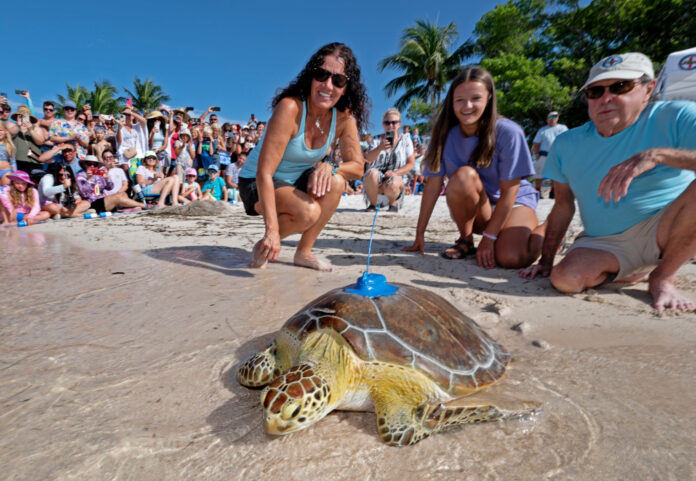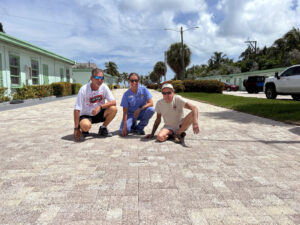
Richie Moretti, director and founder of the world-renowned Turtle Hospital located in the heart of the Florida Keys, was ahead of his time when he renovated a 1950s mom-and-pop hotel and the girly club next store into a veterinary hospital to save sea turtles. The popular destination is an example of ecotourism at its best.
The Turtle Hospital has been rescuing, rehabilitating and returning sea turtles to the wild since 1984, when Moretti received his first permit from the State of Florida to care for marine turtles. For the first two decades, Moretti funded the Turtle Hospital with the income generated by the Hidden Harbor Motel, which he owned and operated.
In 1991, he purchased the gentlemen’s club, Fannie’s, next to the motel and renovated it into a veterinary hospital complete with a surgery suite and an emergency room. Today, the unassuming buildings may appear the same from the outside, adorned in sea foam green, but the modern medical facility behind their doors is on the cutting edge of veterinary medicine applied to sea turtles and educates more than 100,000 visitors a year.
Once motel rooms, the units now provide housing for the hospital’s animal care and maintenance staff. Other rooms have been completely repurposed for sea turtle research, a veterinary office, a water testing lab, equipment repair and retail storage. The fully-functioning veterinary hospital is now equipped with a new generation digital X-ray, 3D ultrasound, anesthesia machine, CO2 laser, electrocautery, class 4 laser, blood processing equipment and state-of-the-art video scopes for endoscopic procedures and surgeries. A full-time vet is on staff and performs sea turtle surgeries 10 days a month.

More than 30 paid employees care for the sea turtles, maintain the buildings and property and offer 15 educational programs daily, 365 days a year. The Turtle Hospital ambulance has grown into a fleet of four ambulances that can be found on the road throughout Monroe County. The team at the hospital staffs a 24/7 stranding hotline with rescues covering more than 200 miles of coastline in the Keys.
In addition to rescues, the ambulances are used to transport staff and sea turtles to schools and community events for educational outreach programs. A few times a month you may see a Turtle Hospital ambulance in the Miami area, where sea turtles are taken to a veterinary ophthalmologist for eye surgeries, or parked at the Key West airport, where veterinarians fly in for sea turtle surgeries.
The facility has had some serious improvements over recent years with the help of Monroe County Tourist Development Council grants. Step behind the white picket gates and you will notice pavers where dusty gravel once lived, a stunning 80- by 50-foot tiki hut offering an open air educational and special events area, guest restrooms and standby generators.
The Turtle Hospital is a nonprofit organization, and the budget to care for sea turtles – once funded by the rental of Hidden Harbor Motel rooms – is now paid by admission fees. Not only does the Turtle Hospital care for sick and injured sea turtles locally, it supports research that helps sea turtles globally. The facility is the largest of its kind and admits sea turtle patients from as far away as New England. The nonprofit now owns the hospital and the property has a deed restriction stating it can only be used for sea turtle conservation.
The Turtle Hospital has been the subject of national and international documentaries and continues to attract visitors. The visitors to the Turtle Hospital are the same visitors enjoying the beautiful waters surrounding the islands, fishing, diving and boating. Six out of every 10 sea turtle rescue calls to the hospital’s stranding hotline come from people who have been through an educational program at the Turtle Hospital. This is a win/win for the sea turtles and for the island community.
— Bette Zirkelbach is the manager of the Turtle Hospital.


















